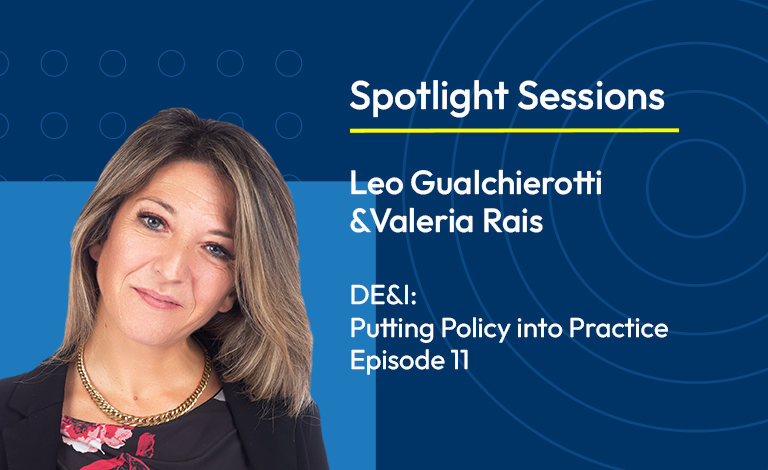For HR teams, talent selection and acquisition are only part of the picture when it comes to building a leadership team.
Without effective onboarding, the prospect of new hires fulfilling their potential and remaining with the organisation for the long term – in other words, being a “bad hire” – are greatly reduced. This is significant, given that a Harvard Business School study discovered bad hires cost organisations $12,500 (€11,500) in lost revenue – and likely much more when other factors, such as reduced morale, litigation fees and regulatory fines are taken into account. Employees who go through a negative onboarding experience are twice as likely to look for other career opportunities in the future.
Inversely, those organisations that have developed a fit-for-purpose onboarding programme are more likely to see their new hires become valuable team members, fast. New hire retention is improved by 82%, and productivity by over 70%, for employers with a strong onboarding process in place.
Yet despite the clear benefits of effective onboarding, a worryingly high proportion of businesses simply aren’t getting it right, with just 12% of employees strongly agreeing that their organisation does a great job of onboarding new hires. This is unsurprising given that 58% of organisations focus their employee onboarding on strictly practical elements like processes and paperwork, while most bring their onboarding programmes to a close after a single week.
Executive coaching can be a vital ingredient in the leadership onboarding process. However, many organisations are failing to take advantage of it. In this guide, the Morgan Latif team explain how executive coaching increases the chance of new leaders succeeding in their role, making them happier, more engaged, and less likely to leave.
What is executive coaching?
First, it is important to understand exactly what we mean by “executive coaching”. What are the objectives, and how are they achieved?
Executive coaching is a process through which leaders are given tailored support from a dedicated coach, with the aim of empowering them to achieve a specific goal. In the case of onboarding, this will be geared toward helping them get up to speed within the organisation. Significantly, coaching is not the same as training. The executive coach does not simply tell the leader what to do; instead, they strive to support the leader to identify their own goals and strategies to reach them, which increases feasibility of and commitment to a solution.
Typically possessing significant commercial experience themselves, the executive coach is able to hold an informed space for the leader to reflect on their experiences and overcome mental or emotional hurdles and self-limiting beliefs (such as imposter syndrome or ingrained behaviours). This is important because a leader joining a new company typically does not have access to a developed and trust-based network, so the number of trustees with whom they can share observations and concerns is limited. The executive coach’s expertise and strict code of confidentiality mean they are superbly placed to take up this role, as executive coach Alexander Meyer auf der Heyde explains:.
“Executives joining a company from the outside typically cannot avail of a widely established network within the new organisation. As such, they might lack trustees with whom they could discuss in order to make sense of observations, challenges or questions they might have. The more political an organisation is, the more challenging this situation will be for the newly joined leader. With the sole interest of making the client successful, an executive coach can fill this gap and be the one with whom to have open conversations in a protected setting.”
What do CEOs and HR expect from executive coaches?
A recent WBECS survey of HR leaders and CEOs who hire executive and leadership coaches showed that they want:
- More consistency in the delivery of high-value results that make an impact;
- Coaches that can build rapport quickly so clients experience better results faster;
- Coaches who can help leaders overcome complex and emerging challenges to increase performance and demonstrate a strong ROI.
How does executive coaching support leader onboarding?
Executive coaching is a bespoke process and the specific objectives will always vary, based on the priorities of the individual leader and the wider organisation. Despite the customised approach, executive coaching is proven to deliver consistent benefits that are specifically useful within an onboarding scenario:
- Faster speed to effectiveness
Starting a new role with a new company throws up countless challenges. It is about more than just adopting new processes, tools and systems; each organisation has a unique culture and an ingrained idea of “how things work”.
These challenges exist for any role – but are felt much more intensely at C-suite level. No leader, however experienced, will be able to immediately overcome every one of them on their own. In fact, almost half of top executives say they were unsuccessful in aligning others around their initial objectives when starting a new role, while more than one-third admit they fell short of meeting their overall objectives for the role.
Unsurprisingly, leaders who receive appropriate support during the onboarding stage get up to speed much faster than those who do not. Indeed, research has shown that time to value is halved when the right support for integration is provided.
This represents a major opportunity for organisations. Given the key role that leaders play in realising large-scale change or transformation, a 50% increase in speed to effectiveness as a result of executive coaching can be immense.
- Greater confidence
Given the success they have enjoyed throughout their careers, it is easy to forget that leaders are not immune from feelings of self-doubt. 36% say they have experienced frequent or high levels of so-called “imposter syndrome”, climbing to 45% among younger leaders (aged 24 to 44) and 54% among women.
Executive coaching can be of major benefit in battling these negative mindsets. Indeed, two-thirds of leaders surveyed by ILM say the extra guidance and support they received through coaching made them feel more positive about the challenge of managing others. What’s more, 88% of respondents insist executive coaching would have helped them during periods when they struggled with a specific project. By helping leaders to work through the challenges they are facing and find their own answers, executive coaching instils self-belief.
- Increased engagement
Culture and engagement are tightly intertwined.Culture dictates the behaviour of an organisation, while engagement denotes how people feel about it. Yet while the vast majority of organisations understand that a positive culture and an engaged workforce lead to stronger performance and more effective talent acquisition, 87% still describe culture and engagement as their biggest challenges.
A good executive coach takes the time to understand the key aspects of an organisation; their decision-making process, values and commercial goals; which makes them ideally positioned to support the integration of new hires. It is unsurprising, therefore, that fewer than one in three HR executives believe they are succeeding in their efforts to familiarise newly hired executives with the organisation, whereas two-thirds of employees from companies with a strong culture of coaching describe themselves as highly engaged.
- Enhanced adaptability
Change management and transformation are often key drivers for hiring new leaders. Fresh skills and perspectives can be of major benefit to organisations looking to disrupt their own models and adopt new systems of working.
Executive coaching can be highly effective in assisting new leaders to deliver transformation projects, making them more adaptable and better able to adjust to significant change. When given one-on-one coaching with a professional coach practitioner, 78% rate it as either “very” or “extremely” helpful in supporting change management initiatives.
Dr. Carolina Kleebaur, Expert for Change Management Consulting and Leadership Coach, notes: “Coaching is a holistic change management format which supports sustainable change initiatives on all levels in respect to readiness (i.e. transparent goals, vision, purpose), willingness (i.e. motivation and participation, role modelling) and ability for change (i.e. having competencies to cope with changes or new ways of working) within the organization.”
- Improved general wellbeing
Happiness and positivity from leaders often flows through the whole organisation, resulting in happier teams. In turn, happier teams have been shown to be more productive. In other words, when executives feel upbeat, the benefits can be felt throughout the business. But, as we have mentioned throughout this guide, the challenges associated with onboarding can be extremely stressful to leaders, thereby damaging their morale, as well as negatively impacting the environment around them.
This is another scenario in which executive coaching can be of benefit. People who receive coaching report that it has a positive effect on both the way in which they work and their feelings toward work. Furthermore, Carsten Schermuly, professor of business psychology at SRH Berlin University of Applied Sciences, notes that coaching has been shown to improve “the health of people, wellbeing and work satisfaction, performance and self-regulation”.
How to select the right executive coach
Of course, it is not simply a case of investing in executive coaching and waiting to reap the rewards. Organisations must match their leaders with the right coaches if the benefits are to be unlocked. Yet with the International Coach Federation estimating that there are almost 19,000 coach practitioners in Western Europe alone, finding the right person for the job is no simple task.
According to Navid Nazemian, an ICF-accredited Executive Coach with a deep expertise in leadership onboarding, leaders looking to find the right coach to partner with should be asking the following questions to ensure maximum impact aligned with desired outcomes:
1. Background
- What is your experience level? It is important to understand the coach’s credentials – not just in terms of paper qualifications, but their general expertise as a coach.
- What are your accreditations, degrees and professional certifications? This can paint a picture of a coach’s motivations and their desire to improve. Ideally, their knowledge and qualifications will be up to date, demonstrating their commitment to adapting and improving their approach over time.
- What is your business understanding and sector experience? While not necessarily a make-or-break factor in choosing an executive coach, it can often be useful if the coach has practical experience of operating in similar organisations.
2. Chemistry
- What is it like to work with you? Leaders should ensure there is chemistry between them and the coach. At the same time, great coaches will always want to know that they are a good fit for the leader in question, too. After all, not everyone is a good candidate for coaching. Likewise, they should seek to understand the objective(s) the leader wishes to achieve, and whether or not they are realistic.
- What examples can you share with me on successful onboarding of previous leaders? Having found out more about the coach, the leader may ask more specific questions about onboarding. Conversely, the coach may wish to share further information about themselves, demonstrating their suitability for the project at hand.
3. Expertise
- What types of clients have you enjoyed most success with? Coaches specialise in different areas. Some are most effective at onboarding, whereas others focus on specific projects or skill sets. It is important that their expertise aligns with the goals of the leadership coaching initiative.
- What kinds of issues can I bring to the table? The boundaries between professional and personal life can sometimes be blurred during the coaching process. Leaders should find out whether the coach is comfortable with discussing personal matters, or would prefer discussions to be strictly work-related.
4. Process
- What is your coaching methodology? Over time, coaches will naturally develop their own approach and process. Dig into this by asking them to talk through a typical client journey that is related to your own ambition.
- What outcomes can be expected? Results will ultimately dictate whether or not a leadership coaching relationship has been successful, so it is crucial to understand what these outcomes will look like and how progress will be measured.
- How do you manage expectations in an organisation? Executive coaching is not just about a one-on-one relationship; it has implications across the wider organisation. The results are likely to impact other members of the C-suite, so expectations must be managed and progress communicated accordingly.
- What diagnostic tools will you use (if any)? Technology can be a major asset in executive coaching – but only if used effectively. Any tool used should add genuine, specific value to the coaching process.
Listen to our podcast – Coaching You Through Crisis – with Navid Nazemian, a PCC (ICF) accredited Executive Coach who gives further insight into how to select the right executive coach.
Morgan Latif can improve your onboarding process through coaching
At Morgan Latif, our involvement in the executive search process does not end when talent has been hired.
We go beyond the professional to the personal, finding life-changing roles for leaders and coaching them through the challenging onboarding period (and beyond). And we back it all up with a market-leading warranty, guaranteeing employee tenure and performance for up to 12 months.
Want to find out how our tailored approach can support you in finding new leaders and onboarding them more effectively? Get in touch with our team.



